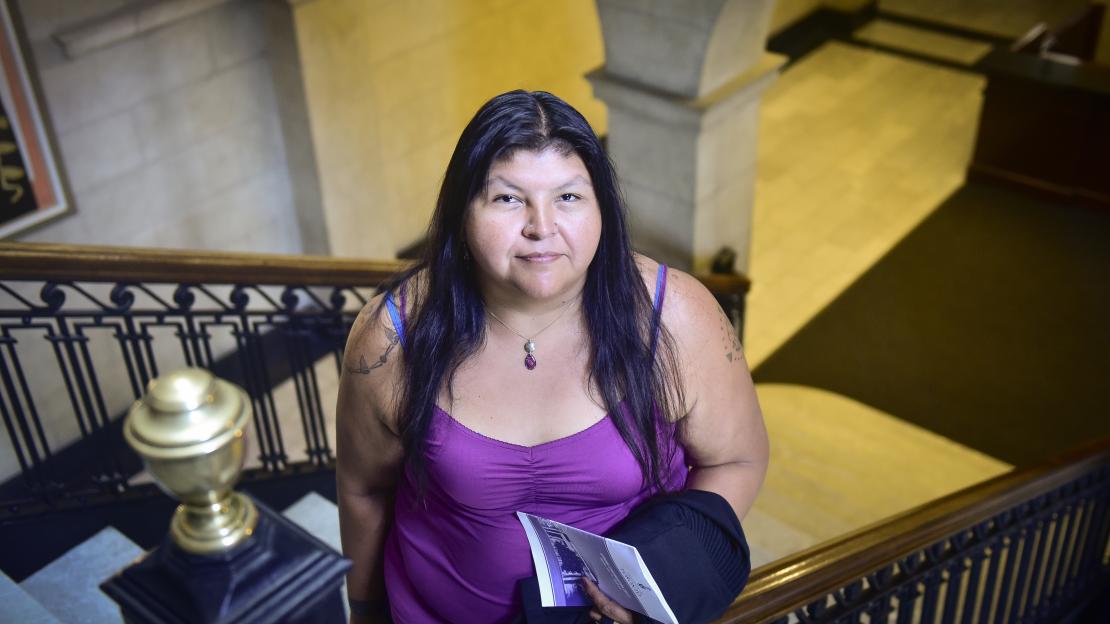Wendy Phillips is sitting in her office, glancing down at the dried sage filling her smudge bowl. She is recounting her own experiences of learning from Indigenous Elders when she was a young girl in an Ojibwe family.
“We have a big family and that’s been a very fortunate thing for me,” says Phillips. “We’ve been blessed to have many different teachers.”
Traditionally, the Ojibwe teachings are relationship based. Elders and teachers take time to recognize the specific gifts within in each, and from there, Elders designate the most appropriate knowledge keeper to help the child fully realize those gifts. For Phillips, a large family dynamic allowed her to interact with many teachers and Elders, always encouraging her to expand her knowledge and experiences with Ojibwe traditions.
Phillips has been appointed as the Indigenous Elder at the University of Toronto Scarborough. Her vast knowledge of Indigenous traditions and her desire to help others contribute to her qualifications.
“I think one of the roles of an Elder at a university is that they’re a support to the students that require any services. Students need to feel welcome and have a sense of belonging,” says Phillips. “This is something I feel is a challenge for any institution.”
With a name that translates to “one who helps,” Phillips has made it her life’s work to take on this challenge. She provides a plethora of services to our students, faculty and staff, including: teachings and training of Indigenous traditions, organizing and conducting traditional ceremonies, and spiritual counselling and guidance.
She has also provided native seeds to U of T Scarborough’s Rooftop Garden—located on the Instructional Centre roof—marking the first time our campus will grow tobacco and ceremonial herbs. Once ready for harvest, the tobacco and herbs will be used as gifts—presented to Elders when a request is being made of them, as per Ojibwe tradition, and in traditional ceremonies on campus. Dried and placed into a hollowed shell bowl, these herbs are burned as part of a smudging ceremony, a common purification ceremony in Ojibwe tradition. The smoke rising from the herbs is meant to create balance by purifying a person’s mind, body and spirit.
Anxiety is a constant hurdle for university students. “The work I’ve done with the students has helped them get through their year a little less stressed, and be able to focus and relax,” she says. “Coping skills are the hardest things to attain. And for us, the meaning for what I do is to provide cultural context and teach others, particularly students, how to develop themselves.”
Phillips organizes bi-annual ceremonial retreats on Indigenous grounds during the fall and winter semesters. Each retreat is a three-day stay where students help tribes build lodging houses, take part in Indigenous ceremonies and feasts, and experience Indigenous practices and traditions. Phillips finds these retreats to be the most moving and inspirational part of her work with students—particularly with international students coming from countries of conflict, who get a chance to take part in purifying ceremonies that allow them to achieve peace and balance.
“We have students from many different backgrounds, and many of them back home, their countries are at war with each other. But yet, here they can function peacefully. It’s a very moving experience.”
U of T Scarborough has agreed to take on 94 calls to action in response to the Truth and Reconciliation Commission established in 2015—some calls to action include: curriculum changes to incorporate Indigenous history and tradition, increased resources available to Indigenous and non-Indigenous community members, and a web portal to communicate with students, staff and faculty about available resources. Phillips believes this is a spark of change.
“The fact that I’m here and we’re able to provide these service definitely is a change, and the hope is that it will continue,” says Phillips, a look of promise across her face. “I always believe, especially for our educational institutions, that they can always evolve. And to me, that’s the point of education.”
Phillips believes a personal approach to supporting the campus community is integral to her work and a main facet of that approach is building trust. She is dedicated to being available to any U of T Scarborough community member that wants to build a relationship with her. You can reach Wendy via email or by visiting her office in Bladen Wing, BV335.
